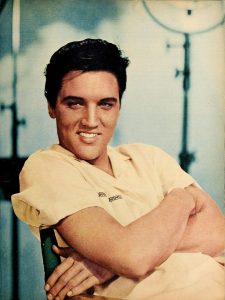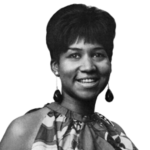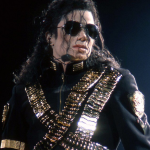
Stage Name: Elvis Presley
Birth Name: Elvis Aaron Presley
Place of Birth: Tupelo, Mississippi, USA.
Date of Birth: January 8, 1935
Died: August 16, 1977 (42 years)
Years Lived: 1935 - 1977
Genres: Country, Gospel, Pop, R&B, Rock and roll
Early Life and Background
Birth and Family
Elvis Aaron Presley was born on January 8, 1935, in Tupelo, Mississippi, USA. He was the only child of Vernon and Gladys Presley. His family was of modest means, and they lived in a small house in a working-class neighborhood.
Childhood
Elvis grew up in a poor family and faced economic hardships throughout his early years. His father, Vernon, was often in and out of work, and his mother, Gladys, worked to support the family. Despite these challenges, Elvis developed a passion for music at an early age, influenced by gospel music from church and the rhythm and blues he heard on the radio.
Education
Elvis attended Humes High School in Memphis, Tennessee, where he was an average student. His real education came from his musical experiences and his growing involvement in the local music scene. He took guitar lessons as a teenager and began performing in local talent shows and events.
Musical Beginnings
First Encounters with Music
Elvis’s first major encounter with music was through his love for gospel and rhythm and blues. His early performances included singing at church and local events. He recorded his first demo in 1953 at Sun Records, which would later become a pivotal moment in his career.
Early Bands or Groups
Elvis began his musical career performing with local bands, including The Blue Moon Boys. He initially worked with the band as a solo artist but soon became known for his energetic performances and distinctive voice. His work with Sun Records in 1954 led to his breakthrough in the music industry.
Career Breakthrough
Discovery
Elvis was discovered by Sam Phillips, the owner of Sun Records, who recognized his potential and signed him to a recording contract. Phillips’s encouragement and the subsequent release of Elvis’s first single, “That’s All Right,” marked the beginning of his career.
Debut Release
Elvis’s debut single, “That’s All Right,” was released in July 1954. It quickly became a regional hit, and his unique blend of country, blues, and rockabilly caught the attention of a wider audience. This single laid the foundation for his future success.
Significant Performances
Elvis’s first major performance on “The Ed Sullivan Show” in 1956 was a turning point in his career, attracting significant media attention and helping him gain national fame. His performance on this show showcased his charisma and dynamic stage presence, solidifying his status as a major entertainment figure.
Rise to Fame
Major Albums and Hits
Elvis’s rise to fame was marked by a series of successful albums and hit singles. His debut album, Elvis Presley (1956), included hits like “Blue Suede Shoes” and “Tutti Frutti.” Subsequent albums, such as Elvis (1956) and Elvis’ Christmas Album (1957), continued his success. His movie soundtracks, including Jailhouse Rock (1957) and Blue Hawaii (1961), further cemented his popularity.
Awards and Recognition
Throughout his career, Elvis received numerous awards and accolades, including three Grammy Awards and an induction into the Rock and Roll Hall of Fame in 1986. He was also honored with a special Grammy Lifetime Achievement Award in 1971.
Collaborations
Elvis collaborated with various artists and producers throughout his career. Notable collaborations include working with songwriters such as Otis Blackwell and producing memorable duets with artists like Ann-Margret. His work with producer Colonel Parker was instrumental in shaping his career.
Personal Life
Relationships
Elvis’s most significant relationship was with Priscilla Beaulieu, whom he married in 1967. They had one daughter, Lisa Marie Presley, born in 1968. Elvis and Priscilla divorced in 1973, but they remained close friends. Elvis also had several other relationships throughout his life, though he often remained a private figure in terms of his personal affairs.
Challenges
Elvis faced numerous personal challenges, including struggles with his health, prescription drug abuse, and increasing pressure from his fame. Despite his success, he experienced periods of isolation and struggled with the demands of his career.
Philanthropy
Elvis was known for his generosity and charitable contributions. He supported various causes, including funding for hospitals, children’s charities, and local community organizations. His charitable work often went under the radar due to his private nature.
Musical Style and Influence
Genre and Style
Elvis’s music encompassed a range of genres, including rock and roll, rhythm and blues, country, and gospel. His style was characterized by his powerful voice, dynamic stage presence, and innovative fusion of different musical elements. Elvis’s ability to blend these genres created a unique and influential sound.
Influences
Elvis was influenced by a wide range of artists and musical styles. His early influences included gospel singers like Sister Rosetta Tharpe, blues musicians like B.B. King, and country artists like Hank Williams. His ability to incorporate these influences into his music contributed to his distinctive sound.
Impact on Music
Elvis Presley is often referred to as the “King of Rock and Roll.” His contributions to music and culture are profound, as he played a key role in popularizing rock and roll and shaping the future of popular music. His innovative approach to music, performance, and style continues to inspire artists across genres.
Later Career and Legacy
Continued Success
Throughout the 1960s and 1970s, Elvis continued to release successful albums and star in films. His 1968 television special, known as the “Comeback Special,” marked a significant return to live performance and rejuvenated his career. His Las Vegas residency from 1969 to 1976 was also highly successful.
Retirement or Passing
Elvis Presley passed away on August 16, 1977, at his home, Graceland, in Memphis, Tennessee. His death was attributed to heart failure, exacerbated by his prescription drug use. His passing was met with widespread grief and mourning from fans around the world.
Posthumous Releases and Tributes
Following his death, Elvis’s music has continued to be celebrated through posthumous releases and tributes. His legacy is honored through various memorials, including Graceland, which remains a popular tourist destination. Tribute concerts and special events continue to celebrate his impact on music and culture.
Discography
Albums:
- Elvis Presley (1956) – RCA Victor
- Elvis (1956) – RCA Victor
- Elvis’ Christmas Album (1957) – RCA Victor
- Jailhouse Rock (1957) – RCA Victor
- G.I. Blues (1960) – RCA Victor
- Blue Hawaii (1961) – RCA Victor
- Fun in Acapulco (1963) – RCA Victor
- From Elvis in Memphis (1969) – RCA Victor
- Elvis: As Recorded at Madison Square Garden (1977) – RCA Victor
- Moody Blue (1977) – RCA Victor (posthumous)
Singles:
- “Heartbreak Hotel” (1956) – Billboard Hot 100: #1
- “Hound Dog” (1956) – Billboard Hot 100: #1
- “Jailhouse Rock” (1957) – Billboard Hot 100: #1
- “Can’t Help Falling in Love” (1961) – Billboard Hot 100: #1
- “Suspicious Minds” (1969) – Billboard Hot 100: #1
Collaborations:
- “In the Ghetto” – with Mac Davis
- “A Little Less Conversation” – remix featured in the 2002 soundtrack Elvis: 30 #1 Hits
Conclusion
Summary of Impact
Elvis Presley revolutionized the music industry with his unique sound and charismatic performances. Known as the “King of Rock and Roll,” his contributions to music and culture were groundbreaking and continue to influence artists and entertainers worldwide.
Legacy
Elvis Presley remains a cultural icon and a seminal figure in music history. His impact is celebrated through various memorials, including Graceland, and his music continues to be enjoyed by new generations. His legacy is preserved through ongoing tributes and the enduring popularity of his recordings.
















Leave a Reply